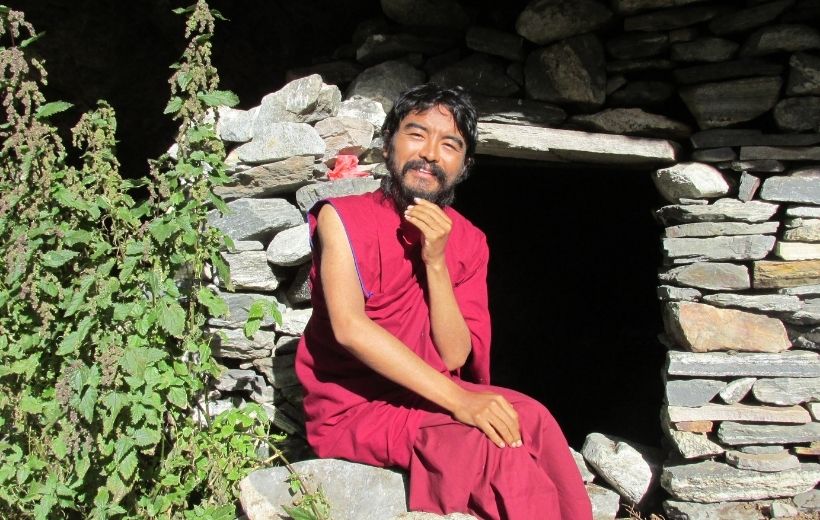Preventing Conflict in a Group
By Yongey Mingyur Rinpoche • 6 min read
If you have more than one person in a room, you’ve automatically got more than one set of opinions and ideas there, too. And, generally speaking, you’re in a room full of folks secretly thinking that their ideas are best of the lot. As a thought experiment, imagine you’re on a bus that’s bumping down a potholed, rutted dirt track. The bus is lurching and bucking along when suddenly it fishtails and nearly careens into a ditch. At that moment, most of us will think, “If I were driving the bus, we’d all be a lot safer!” Of course, that impulse is a fuse that easily ignites into conflict.

When we approach a situation within a group, we often bring along our own ideas with the notion that they’re pretty good ones. The thing is, once we realize that other people’s ideas aren’t too shabby either, it raises a question in our minds: whose is better? Typically, once we present our case or position, we want to hang on to it. Subconsciously, we don’t want to lose face. Plus, some of us can’t resist the siren call of showing off our intelligence or expertise. “Everyone here has an excellent idea,” we might remark, “so why not use mine?” That’s the problem of clinging to a positive self-image. An equally problematic response comes from negative self-image — something along the lines of “If I weren’t such a worm, maybe I could compete with this brilliant crowd.” Either way, we’re engaging with our own egos, rather than really listening to others, and that can really trip us up.
To do an end run around either of those unproductive reactions, the first important step is to listen. Everyone has unique talents, qualities, approaches, and methods of problem-solving. So, make the effort to hear what others have to say. Let go of your own valid idea, and embrace someone else’s. Then, when you work together, the other party will feel happy that they’re being taken into account and inspired to put a lot of energy into it. (You, too, should put sincere energy into it). Another good strategy is to hold your piece until others are done talking. Sometimes you truly will have the best idea, or the right answer — but if you come charging in to brandish it right at the beginning of a discussion, it loses value. So listen to everyone else’s suggestions, first. You might end up saying the exact same thing you would’ve said at the start, but since every member of the group has had a chance to air their idea, it gains worth and significance.
“If we could see the whole truth of any situation, our only response would be one of compassion.”
– Mingyur Rinpoche –
“Listening first,” by the way, doesn’t mean nodding your head and going, “uh-huh, uh-huh” while you wait for your turn to speak. It means deep, active listening, so you can really perceive the basic goodness of your counterpart. If you try to connect with that person, usually you’ll be able to find a way to communicate with them. After all, that individual has basic innate goodness. On a fundamental level, they want to be happy and free from suffering, just like you. And in truth, there are so many ways to connect. Once you can see that person as a friend, you’re not so likely to get into mindless conflicts with them. Listening, connecting, making friends — all of this is based on seeing other peoples’ innate basic goodness, and viewing your connection to them with love and compassion.
If you enjoyed reading our articles, please join our mailing list and we’ll send you our news and latest pieces.
Learn meditation under the skillful guidance of world-renowned teacher Yongey Mingyur Rinpoche at your own pace.

In his approach to teaching meditation, Mingyur Rinpoche integrates traditional Buddhist practice and philosophy with the current scientific understanding of the mind and mental health – making the practice of meditation relevant and accessible to students around the world. Mingyur Rinpoche is the author of the best-selling book The Joy of Living: Unlocking the Secret and Science of Happiness, as well as Joyful Wisdom: Embracing Change and Finding Freedom, In Love with the World: A Monk’s Journey Through the Bardos of Living and Dying, and many others.

A quiet moment of confusion becomes an unexpected teacher, revealing how ignorance and wisdom are two ways of meeting the same open space.

If your days feel packed and pressured, this post shows how the simple habit of pausing to just be can change everything.

Ten years ago Mingyur Rinpoche returned from his wandering retreat. Hear from the Tergar Instructors about the magical week when Mingyur Rinpoche emerged from his four-and-a-half-year retreat.
If you enjoyed reading our articles, please join our mailing list and we’ll send you our news and latest pieces.